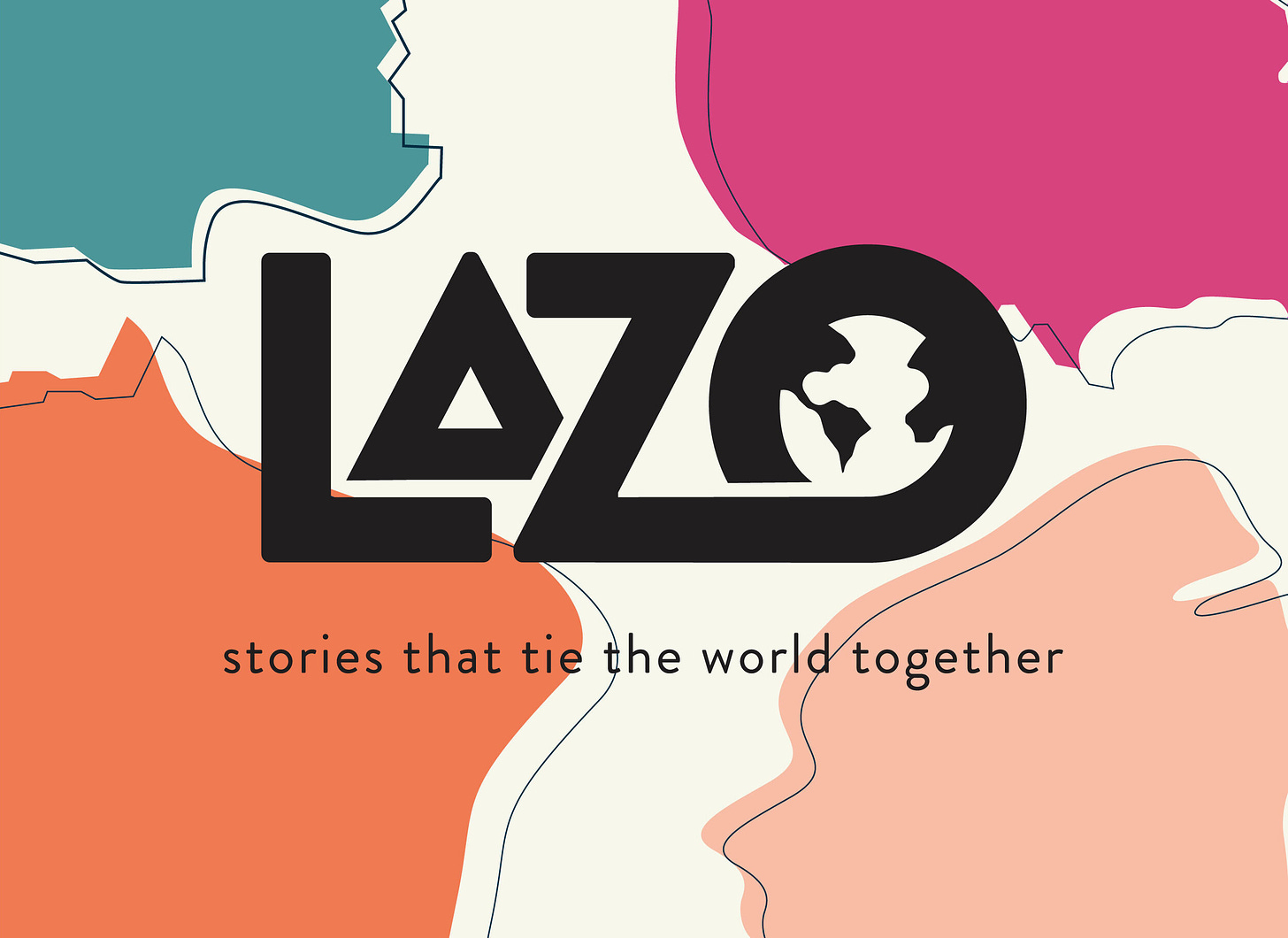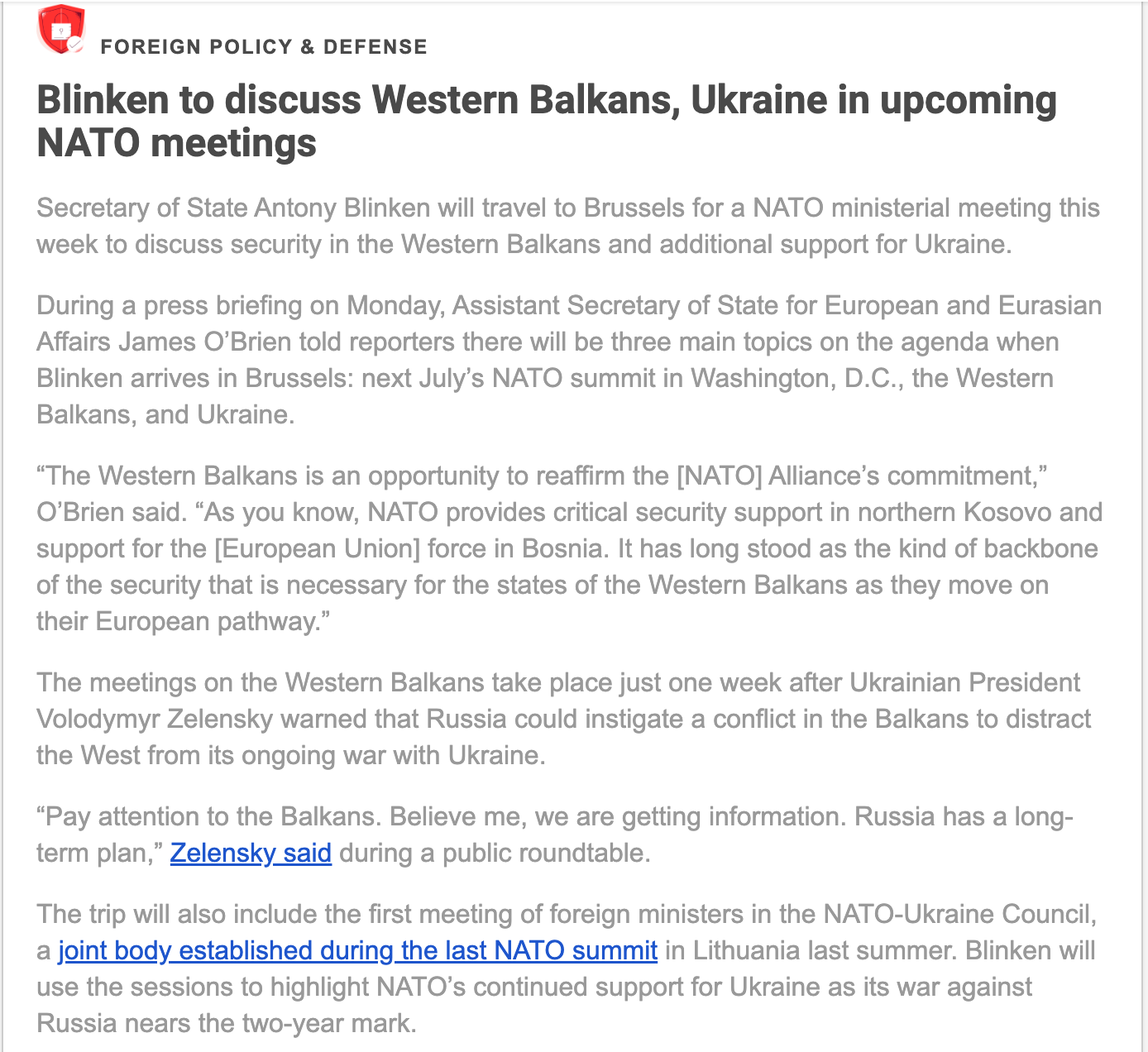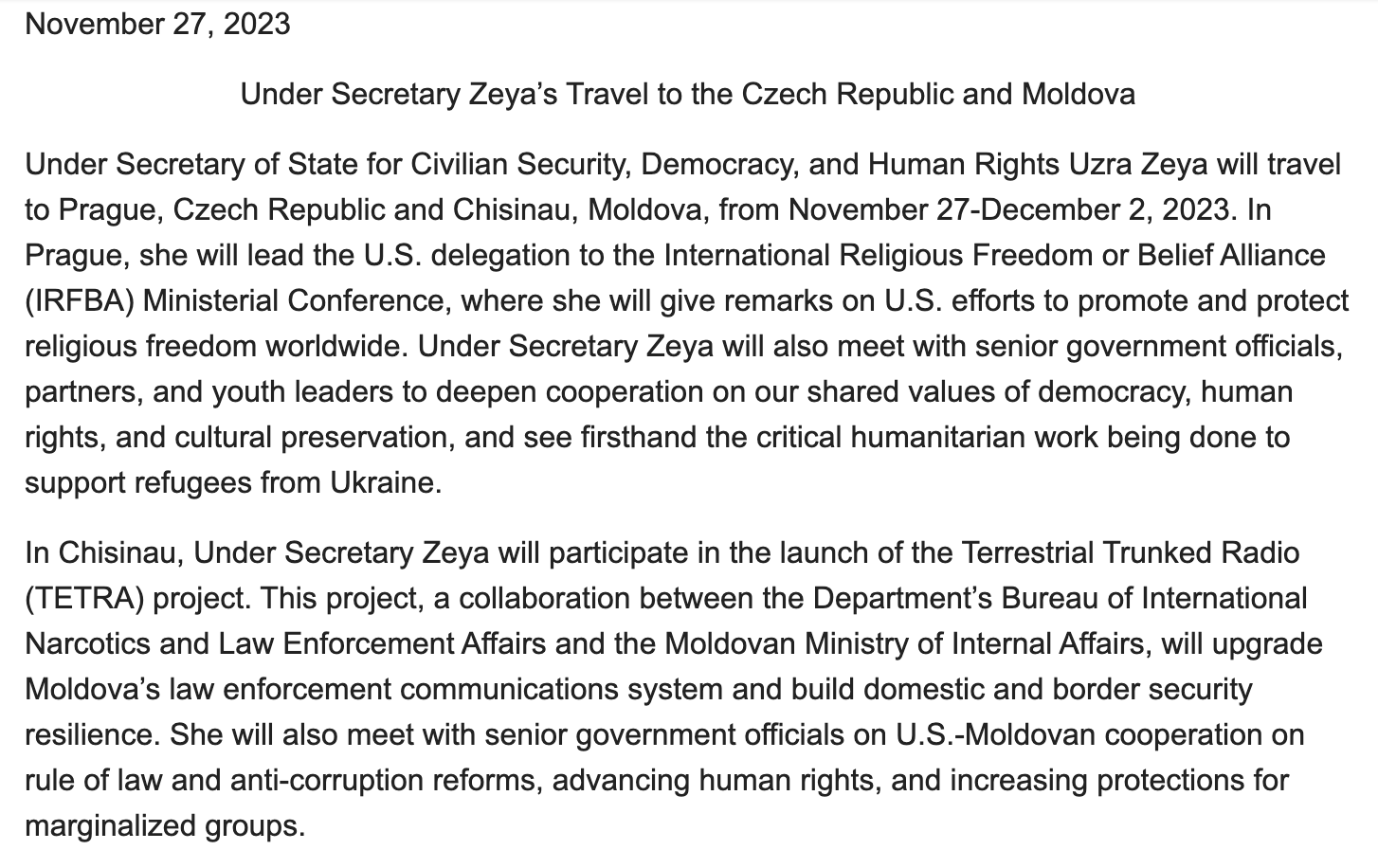A place that made me feel different.
And "the greatest cultural extravaganza that one could imagine."
There are some trips that are just short reprieves that quickly fade from memory. And then others should feel short because they are, yet are somehow so meaningful that they completely alter your state of mind. They pull you out of the parts of your life where you’re stuck and into the version of the world you wish existed, showing you that it’s possible to feel differently.
My recent trip to Berlin was one of those latter journeys. It’s hard to say precisely why. Maybe it was because I was so present and engaged with what was in front of me that I forgot about my responsibilities or worries in a way that felt revolutionary, as if my real life had completely faded away and all that was left was the experience at hand.
Perhaps it was because I was in an environment in which I fit in, something that rarely happens to me, a perpetual and professional interloper. Or maybe it was because I was surrounded by friends who showed me the type of platonic love I wished to experience during every mundane interaction. Perhaps the beats of Tresor rearranged my brainwaves, or I became entranced because the city is, as David Bowie said, “the greatest cultural extravaganza that one could imagine.”
Whatever it was, this short trip felt like true contentment. There was a warmth and glow to every interaction, a knowing nod of acknowledgment with every rumpled, hooded stranger, a sense that somehow I’d returned to where my soul was waiting for me. In other words, I had a very nice time in Berlin. I wonder why it took me so many years to go back.
And it seems I’ve brought back whatever magic I picked up in Germany because people keep looking at me and smiling. On the train and the streets of D.C., people make eye contact and nod for apparently no reason, as if there were some invisible sheen about me that I didn’t previously possess. I’ve come back softer and nicer and less tired, with a renewed enthusiasm for life and work. If only every short holiday could be like this.
My dear friend Aurélien Thome, a musician and audio engineer based in Paris, took these photographs of our trip.
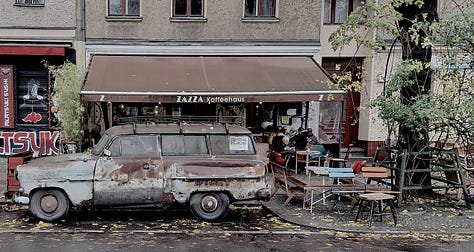
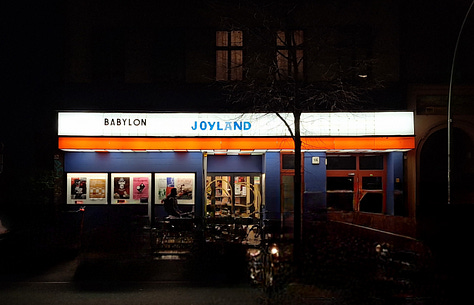
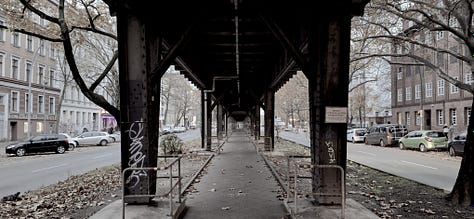
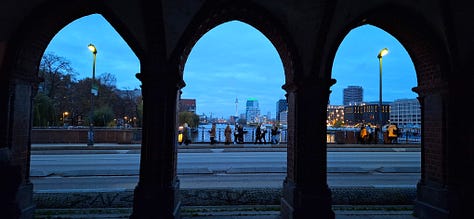

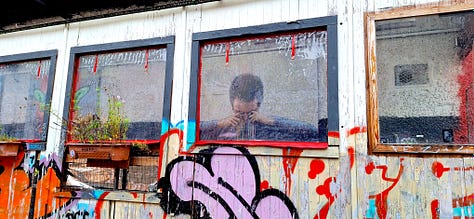
Back in D.C., Congress is taking a minute to warm up after the Thanksgiving break (I spent Thanksgiving Day eating Chinese food in South London with friends, taking a quick detour on my way back to the States, so I wasn’t as weighed down by stuffing and mashed potatoes as everyone else. Shoutout to JinJiang restaurant in Deptford).
Lawmakers in the House and Senate started a formal conference to begin negotiations on the must-pass annual defense policy bill, the National Defense Authorization Act. They’re also (still!) trying to hammer out the details of the $106 billion national security supplemental that will include money for Ukraine, Israel, and Taiwan. But first, Republicans want significant changes to U.S. border and immigration policy to be included in the bill.
The Sunday after I flew home, I trawled through 250 emails with pitches for Lazo Magazine. I commissioned five articles that will be online sometime in December and January. If you can afford to become a paid subscriber of this newsletter, or to donate to Lazo Magazine, please do. All the money will go to supporting writers.
What I’m writing:
• I wrote a deep dive into U.S. policy toward China and spoke to U.S. lawmakers after the Biden administration briefed them on the president’s deals with Beijing. This story is unlocked and free to read.
My weekly news blurbs:
What I’m reading:
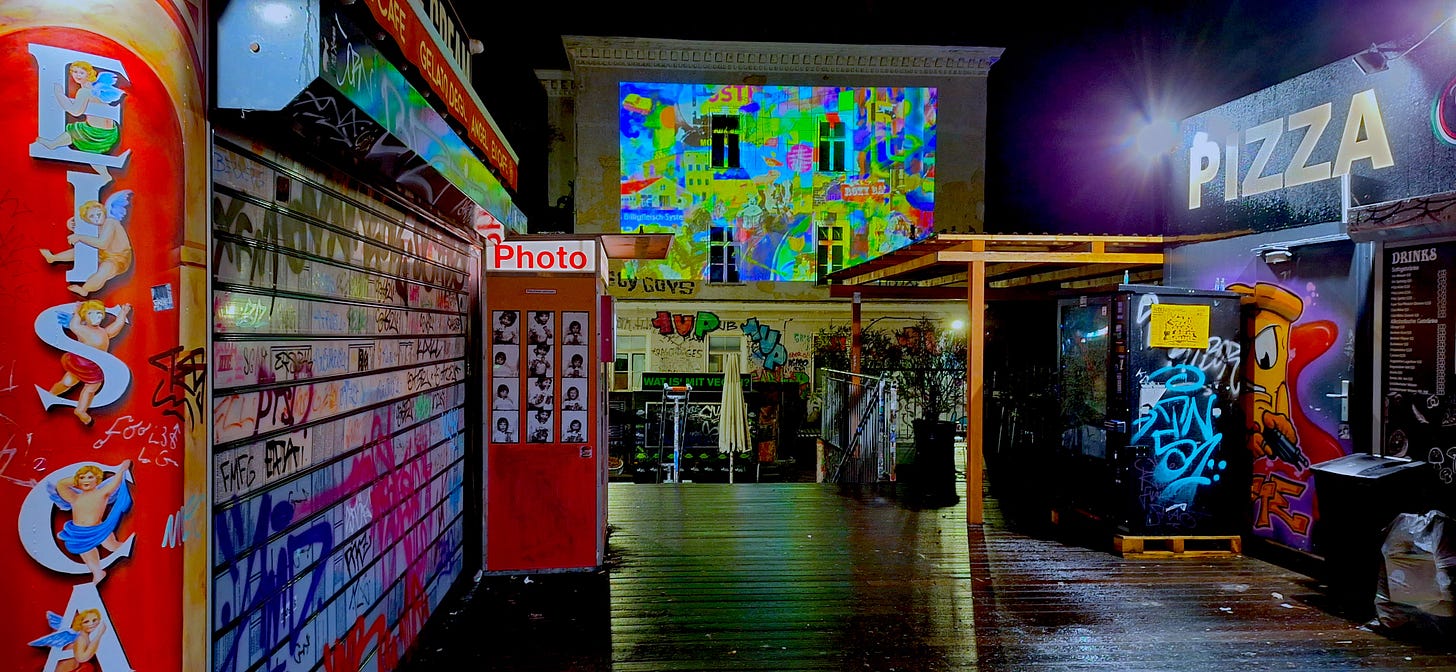
• The United Arab Emirates hopes to strike oil and gas deals with 15 countries by using its role as host of the COP28 climate summit, according to leaked documents. The BBC has the story.
• After nearly a week’s pause, war resumed in Gaza, Reuters reports. Thirty-five people were killed and dozens wounded by Israeli airstrikes just two hours after the fighting pause agreement ended.
• Russia downed at least 24 Ukrainian drones over the Moscow region, just one day after mass drone strikes on Kyiv, the Associated Press reports.
• A Russian Presidential candidate, Yekaterina Duntsova, said Moscow should end the conflict in Ukraine, release political prisoners, and reform the division between Russia and the West, Reuters reports.
• LGBT activists condemned a November 30 ruling by Russia's Supreme Court banning the activities of the "international LGBT movement" in the country, Radio Free Europe reports.
• The wife of Kyrylo Budanov, Ukraine’s military intelligence (GUR) chief, was poisoned and is undergoing hospital treatment, Reuters reports. The GUR has been involved in covert operations against Russia, and Budanov himself has been the target of several attacks, including a botched car bombing.
• A fire that ripped through a train traveling through a rail tunnel in eastern Russia was due to “four explosive devices” planted by the Ukrainian Security Service, CNN reports, citing a Ukrainian defense source.
• Alyaksandra Kasko, a 30-year-old Belarusian rights activist who was arrested in early February after she returned from Poland, went on trial in the western city of Hrodna, Radio Free Europe reports.
• Hundreds of migrants from the Middle East and Africa have appeared at Finland’s border from Russia, seeking entry into the Nordic country, the Associated Press reports.
• Dozens of migrants from Asia and Africa drown every year in the rivers between Serbia, Bosnia and Herzegovina, and Croatia, the JournalismFund Europe reports.
• Polish truckers are blocking four border crossings shared with Ukraine over a dispute that they are losing out to Ukrainian companies that offer lower prices for services and transport foods within the European Union, Reuters reports.
• Hungarian Prime Minister Viktor Orbán is threatening to block all European Union aid for Ukraine, as well as the country’s future accession to the bloc, according to a letter seen by Politico Europe. Hungary’s Orbán is blocking a €50 billion EU top-up package to help Ukraine over the coming years and has blocked a €500 million tranche of military aid.
• Hungary does not support a “premature proposal” that would allow Ukraine to become a member of the E.U., according to Gergely Gulyas, Chief of Staff to Hungarian Prime Minister Viktor Orbán. The Associated Press has the story.
• In a northern part of Greece’s capital, the neighborhood of Exarcheia — the historical center of radical left-wing politics, adored in equal measure by intellectual activists and scruffy late-night revelers — gentrification threatens to bring an end to a scene of alternative culture and protest, writes Nektaria Stamouli for Politico Europe.
• Far-right leader Geert Wilders’ attempt to form a government in the Netherlands suffered a setback, as the business community warned against political instability scaring off investors, the Financial Times reports. Dilan Yeşilgöz, leader of the right-leaning liberal VVD party, said she would not form a coalition with Wilders.
• Far-right protesters in Dublin began rioting and attacking police after three children were injured in a knife attack outside a school, the Hill reports.
• France is proposing to ban extreme-right groups in response to violent protests sparked by the murder of a 16-year-old, BBC News reports.
• The Catalan separatist Junts party would be willing to withdraw support from Spanish Prime Minister Pedro Sánchez’s government if “there is not sufficient progress” in negotiations for Catalan independence, its leader Carles Puigdemont said. Politico Europe has the story.
• The Israeli government said it would summon the Belgian and Spanish ambassadors following remarks by Spanish Prime Minister Pedro Sánchez and his Belgian counterpart Alexander de Croo on the war between Israel and Hamas, the Times of Israel reports. The two leaders appeared at Egypt’s Rafah crossing near Gaza.
• Israel recalled its ambassador to Madrid and said it would reprimand Spain’s ambassador in Tel Aviv after Spanish Prime Minister Pedro Sánchez said he had “serious doubts that Israel is complying with international humanitarian law.” It’s the second major diplomatic spat between the two countries in just over a week. The Guardian has the story.
• Arab states and the European Union agreed at a meeting in Spain that a two-state solution was the best answer to the ongoing conflict between Hamas and Israel, Reuters reports.
• Israeli Prime Minister Benjamin Netanyahu vehemently denied accusations he allowed Qatar to fund or grow Hamas to cause divisions among Palestinians, labeling the claims as “ridiculous,” Politico reports. Political opponents in Israel have long argued that Netanyahu boosted Hamas in a “divide-and-rule” approach that aimed to create a rivalry between Islamist militants and Hamas in the West Bank.
• Israel learned of Hamas’ attack plan over one year ago, according to a 40-page Israeli document code-named “Jericho Wall,” which outlined in precise detail the invasion and ground assault Hamas carried out on Oct. 7. The New York Times has the story.
• Hamas claimed responsibility for a fatal shooting in Jerusalem that killed three people and injured seven others, saying it was a “direct response to the unprecedented crimes committed by the occupying forces, including brutal massacres in the Gaza Strip, the killing of children in Jenin, and widespread violations against Palestinian prisoners.” CNN has the story.
• The Palestinian militant group Tulkarm Brigades killed two men in the West Bank accused of collaborating with Israel and hung their bodies up as a warning, Reuters reports.
• Palestinian prisoners released from Israeli jails alleged they suffered abuse and collective punishment, including being hit with sticks, having muzzled dogs set on them, receiving rape threats by prison guards, and being tear-gassed, the BBC reports.
• The Chief of the World Health Organization said more people in Gaza could die from disease than from bombings. More than 1.3 million people are living in overcrowded shelters without access to medication or basic supplies, and over 110,000 civilians are suffering from respiratory infections, scabies, and lice.
• A British-Palestinian surgeon who treated patients at Gaza hospitals estimates that between 700 to 900 children have had limbs amputated since the war broke out, CNN reports.
• The Biden administration told Israel it must work to avoid “significant further displacement” of civilians in Gaza if it renews its military campaign after the fighting pause, the Associated Press reports.
• Four Palestinians, including two children, were killed by Israeli forces during a raid in the city of Jenin in the occupied West Bank, BBC News reports.
• Brazil has “intensified defensive actions” along the northern border as a dispute with neighbors Venezuela and Guyana continues, Reuters reports.
• With presidential elections in the Democratic Republic of the Congo (DRC) scheduled for December, concerns about pre-election human rights violations are already being raised, according to Responsible Statecraft.
• Sierra Leone’s President Julius Maada Bio said most of the leaders involved in the recent attack on a military barracks in the country’s capital were arrested, adding that an investigation is continuing and security operations are in place, Reuters reports.
• Somali pirates tried to hijack an Israeli-owned ship, VICE reports.
• Heavy gunfire was reported in the capital of Guinea hours after some National Guard soldiers freed a detained minister and a senior state official using AK-47 weapons and bazookas, the BBC reports.
• Federal prosecutors charged an Indian national in an attempted murder-for-hire plot that would have seen the assassination of Gurpatwant Singh Pannun, a prominent Sikh political activist in New York City, according to an indictment.
Interesting statements:
You can write to me for any reason: c.maza@protonmail.com





